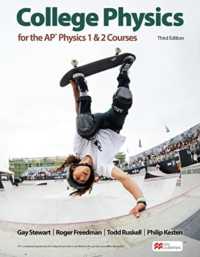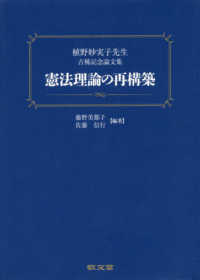- ホーム
- > 洋書
- > 英文書
- > History / World
Full Description
The Cambridge History of the Holocaust offers a comprehensive and innovative overview of the complex field of Holocaust history from a variety of interpretive perspectives. The first volume begins with essays outlining the evolution of Holocaust historiography and the central conceptual and methodological questions facing historians. Further chapters provide insights into the longer-term causes and contexts of the Holocaust, before focusing on its immediate pre-history. The volume examines Holocaust archives, race-thinking and eugenics, violence in Weimar Germany, Hitler and Nazi ideology, and the implementation of antisemitic policies in the run up to the Second World War. Its ambitious coverage provides an unparalleled overview of the development of the policies that created the conditions necessary for the Holocaust to take place.
Contents
General Editor's Introduction Mark Roseman; Introduction to volume I Mark Roseman and Dan Stone; 1. Historiography of the holocaust: early developments Boaz Cohen; 2. The historiography of the holocaust: the years of diversification and integration Dan Stone; 3. From 'final solution' to 'holocaust'. Autobiographical reflections Jane Caplan; 4. The holocaust, genocide, and the origins of the commensurability problem A. Dirk Moses; 5. Fascism and holocaust Aristotle Kallis; 6. The holocaust and modernity Mark Roseman; 7. Integrated approaches and boundaries in holocaust scholarship Dan Stone; 8. Mapping the holocaust Tim Cole; 9. Archiving the holocaust Jan Lambertz; 10. Antisemitism in interwar Europe Ulrich Wyrwa; 11. Race-thinking, Völkisch-nationalism, and eugenics Eric Kurlander; 12. Inter-ethnic violence in Europe before the holocaust Robert Gerwarth; 13. Communism and anti-Communism Andreas Wirsching; 14. Weimar Germany's vanishing point: politics, violence and the rise of the nazis, 1918-1933 Annemarie Sammartino; 15. Hitler and the Nazi party Thomas Weber; 16. Hitler, state and party Helmut Walser Smith; 17. Anti-semitic policy in the early years of the third Reich Hans Christian Jasch; 18. Popular participation in anti-Jewish policy up to 1938 Michael Wildt; 19. Nazi biopolitics: eugenics, racial policy, and the persecution of 'Asoziale,' 1933-1939 Richard F. Wetzell; 20. 'Judenforschung' -Nazi Jewish studies Dirk Rupnow; 21. Belonging and belongings: the dispossession of German Jews Christoph Kreutzmüller and Jonathan Zatlin; 22. Kristallnacht Alan E. Steinweis; 23. Lebensraum, autarky and a new imperial order Richard Overy; 24. International responses to nazi race and Jewish policy, 1933-1939 Jonathan Wiesen.







